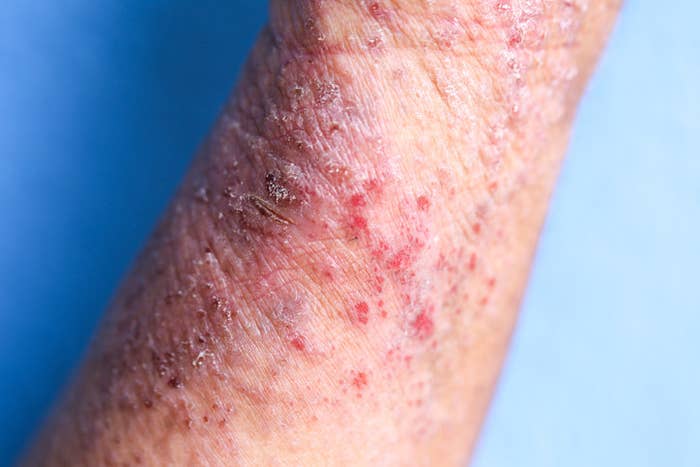
MOST forms of eczema can be prevented by hydrating the skin. That makes it extra-sensitive year.

People with eczema have drier skin but drinking enough water can help keep the skin hydrated per the National Eczema Association.
Does cold water help eczema. Eczema-prone skin lacks the normal barrier that helps protect skin against irritants and bacteria as well as retain moisture. That makes it extra-sensitive year. Wind low humidity cold temperatures harsh soaps and too much washing without the use of a moisturizer can lead to dry skin which can irritate your eczema and even make it worse.
People with eczema especially atopic dermatitis tend to have very dry skin in general. This is because the disease causes defects in the skin barrier. The skin barrier is upper most layer of skin that protects irritants.
The truth is that there are more effective ways of keeping your skin hydrated than drinking lots of water. Eczema is an issue with the skin barrier function with dehydrated cells meaning that the barrier against moisture loss and irritants isnt working as well as it should. Finding more direct and immediate ways to lock moisture into the skin is essential.
But dermatologists warn that hot water makes eczema symptoms worse because it dries out the skin. And at extreme temps you could sustain a serious burn. Short daily soaks in cool or warm.
The new study which was funded by Harvey Water Softeners is published in the Journal of Investigate Dermatology. The team of researchers examined whether removing the calcium and magnesium ions using an ion-exchange water softener could mitigate the negative effects of hard water on the skin. They found that using a water softener reduces the harmful effects of surfactants potentially decreasing.
Does Drinking Water Help Eczema. People with eczema have drier skin but drinking enough water can help keep the skin hydrated per the National Eczema Association. According to the University of Missouri System adults should aim to drink half their body weight in ounces each day to stay hydrated.
What Foods Should You Avoid When You Have Eczema. This decrease causes the skin to lose water interfering with its ability to maintain moisture. This can lead to dryness and make your eczema worse.
Lotions may not be as effective at treating winter eczema. For painful itchy flare-ups you may also use a cream containing hydrocortisone or hydrocortisone acetate. You should talk to your.
Chlorine can help or hurt Chlorine is the most common disinfectant that gets added to the water in swimming pools. It can be irritating to some eczema skin but many find that swimming in a chlorinated pool has a soothing effect thats similar to taking a bleach bath. If youre in the former group choose a fresh-water alternative.
Run the coldest water over it However more itches follow most of the time. But it does help really well. Remember to run as cold as you can.
In my experience showers arent good for eczema. Skin doesnt react well to the repetitive force of water against it. Between baths and showers cold showers should be viewed as a middle option.
They are a great alternative to long hot showers but not near as good for skin as baths. Removing whatever is causing the allergic reaction is the easiest and most effective treatment. MOST forms of eczema can be prevented by hydrating the skin.
Dry skin is the most common form of winter eczema. The cold weather has a tendency to dry your skin and cause dermatitis. The science indicates that water softeners do not provide any additional benefits over and above the standard treatments for children with moderate to severe eczema.
So why are children in hard water areas more likely to suffer from eczema. 83 maintained that the water softener reduced the severity of their childs eczema of the 78 regularly applying emollients or steroid cream 67 were using less. Perhaps more convincingly at the end of the study two-thirds of the families opted to purchase the water softeners.
Ice therapy for eczema numbs your inflamed skin. The icy cold of the ice makes your veins contract and thereby cutting down blood circulation. When you remove the ice pack your veins will start to dilate.
Blood is rushed into the area that you are treating.